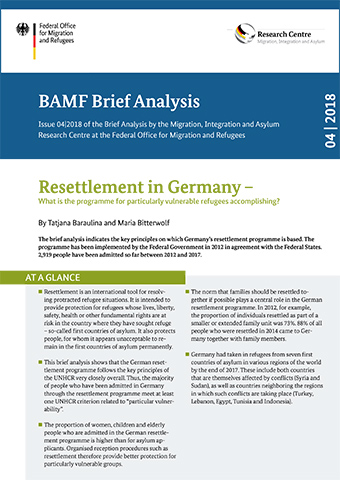Resettlement in Germany - What does the admission programme for particularly vulnerable refugees achieve? ,

The BAMF-Brief Analysis demonstrates the key principles on which Germany's resettlement programme is based. The programme has been implemented by the Federal Government in 2012 in agreement with the Federal States. 2,919 people have been admitted under this programme between 2012 and 2017.
Resettlement is a humanitarian admission programme for people who have been displaced across the borders of their countries of origin and who are staying in so-called “first countries of refuge”. The international programme aims at those refugees who receive insufficient protection under the current conditions of residence. It also protects people, for whom it appears unacceptable to remain in the first countries of refuge permanently.
The UNHCR's key resettlement functions
The United Nations Refugee Agency (UNHCR) defines three fundamental functions of resettlement:
Contact

- Resettlement is a tool to provide international protection and meet the specific needs of the most vulnerable refugees.
- Resettlement is a durable solution for refugees who have already been in a third country for a prolonged period, and who have no prospects for integration there but can also not return to their countries of origin.
- Resettlement is an expression of international solidarity and a responsibility sharing with countries which are highly affected by displacement movements.
This Brief Analysis shows that the German resettlement programme follows the key principles of the UNHCR very strictly. The majority of individuals who are admitted in Germany via the programme meet at least one criterion related to “particular vulnerability”. For example, priority is given to persons with special medical needs, victims of violence and torture, or women who are affected by specific protection or safety problems because of their gender, as well as children and older people.
Better protection for particularly vulnerable groups and families
Contact

The proportion of women, children and older people who are admitted in the German resettlement programme is higher than among asylum applicants. Therefore organised reception procedures such as resettlement provide better protection for particularly vulnerable groups.
The norm that families should be resettled together if possible, plays a central role in the German resettlement programme. In 2012, for example, the proportion of individuals resettled as part of a smaller or extended family unit was 73 percent. 88 percent of all people who were resettled in 2014 came to Germany together with family members.
Relieving the burden on first countries of refuge
Germany had taken in refugees from seven first countries of refuge in various regions of the world by the end of 2017. These include both countries that are themselves affected by conflicts that trigger displacement (Syria and Sudan), as well as countries neighbouring to the regions in which such conflicts are taking place (Turkey, Lebanon, Egypt, Tunisia and Indonesia).
The Brief Analysis was drawn up by: Tatjana Baraulina and Maria Bitterwolf

